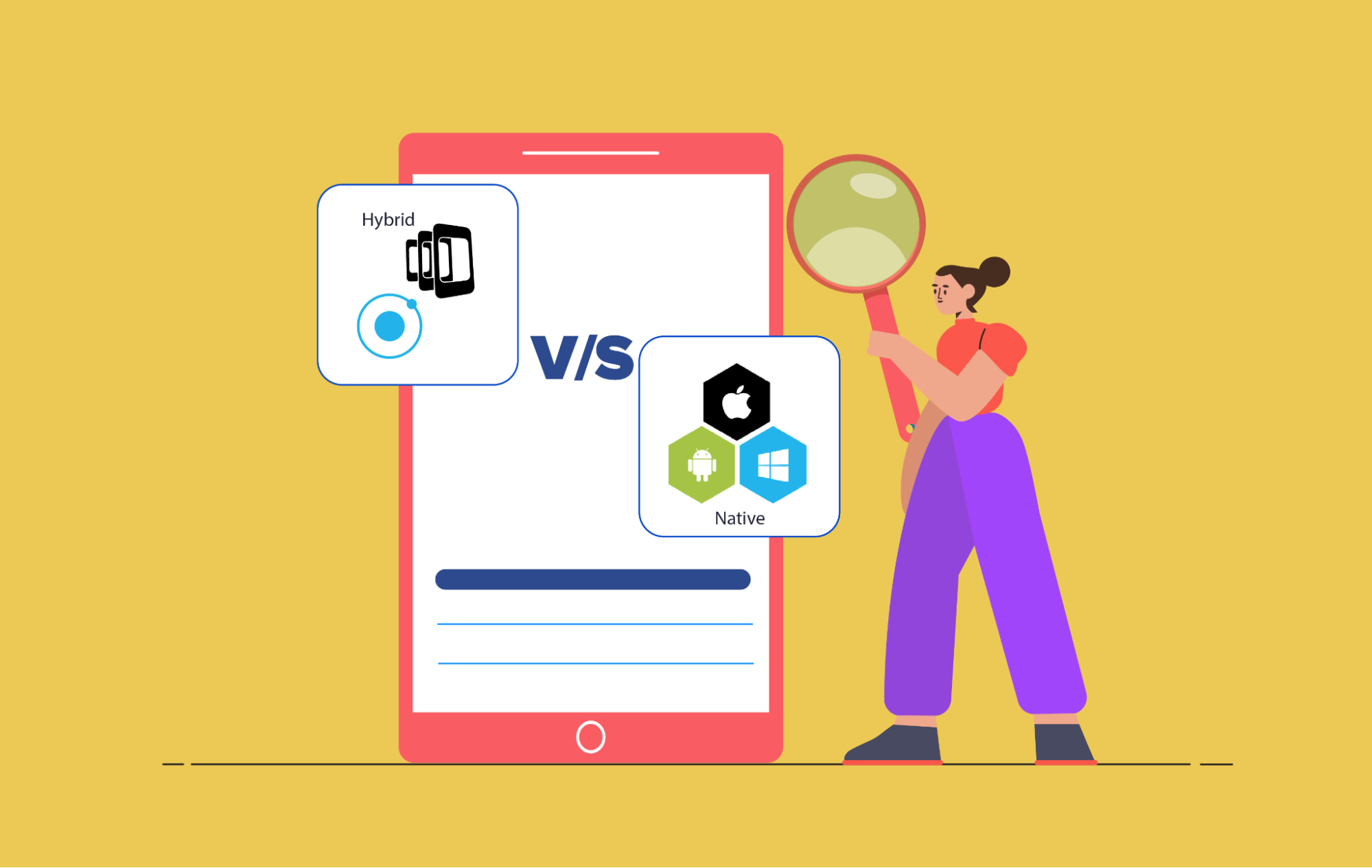Mobile applications play an important role in expanding customer outreach and delivering seamless user experience. When considering the best approach, businesses have two options: Native and Hybrid Apps.
Native apps are designed using specific programming languages and tools, and tailored for specific platforms like iOS and Android. On the other hand, Hybrid apps use web technologies such as HTML, CSS, and Javascript to ensure compatibility across various platforms.

When considering options for mobile app development, it is essential to assess the benefits and drawbacks of both approaches i.e. Native and Hybrid. The ultimate decision depends on your application’s specific goals and desired outcomes for your business. I will discuss both sides extensively so that you can make informed decisions and determine the most suitable strategy for your upcoming mobile app project.
What is Native App Development?
Native app development involves creating applications that are specifically optimized for a particular operating system. This requires using programming languages and tools tailored to that system.
In creating iOS apps, developers from leading and top mobile app development companies use Swift or Objective-C in combination with the Xcode Integrated Development Environment (IDE). On the other hand, Android apps are developed using JAVA or Kotlin alongside the Android Studio IDE.
These applications can use specific functionalities of devices, such as cameras, GPS, contacts, and push notifications. This allows them to deliver a seamless user experience. Moreover, they generally outperform hybrid or web apps while ensuring enhanced security. Developing these apps requires more time and financial investment than other approaches.
Advantages of Native App Development
Native app development offers numerous advantages that make it a preferred choice for many businesses and mobile app development companies.
- Fast Performance: Native apps deliver enhanced performance using optimized designs tailored to specific platforms. By using the platform’s resources, these applications ensure seamless and rapid execution, resulting in exceptional speed and efficiency.
- Access to Special Features: Users can use various device functionalities, including the camera, GPS, and sensors. This capability allows developers to create advanced applications that ensure superior user experiences.
- Enhanced User Experience: Native apps offer an enhanced user experience through a seamless and intuitive interface. They effortlessly integrate smooth animations, swift loading times, and user-friendly designs. This results in a natural navigation experience and ultimately leads to high user satisfaction.
- Improved Security: It is a notable advantage offered by native mobile apps. Unlike web apps, they use robust security features inherent to the platform they operate on. Moreover, their capability to locally store data adds an extra layer of protection, making it more challenging for hackers to gain access to sensitive information.
Disadvantages of Native App Development
Native apps offer numerous advantages. However, it’s important to consider potential drawbacks impacting user experiences and development processes.
- Longer Download Time: Native apps often experience longer download times. Users must navigate the app store, search for the desired app, agree to terms and conditions, and then proceed with the download. If this process becomes lengthy, potential users may lose interest and abandon the download before completion.
- Delay in Feature Release: Regarding releasing features across multiple platforms simultaneously, the challenge lies in the unique codebase of native apps. This complexity often causes delays in feature releases on different platforms.
- High Development Cost: Increased development costs pose a significant challenge when creating native apps. The process requires skilled developers for each platform, adding to the expenses of developing, maintaining, and managing the same application. As a result, overall development cost expenses can significantly escalate.
What is Hybrid App Development?
Hybrid app development combines the best of both native and web applications, making them incredibly versatile for mobile development. These apps use popular web technologies such as HTML, CSS, and Javascript while residing in the native app container. This approach allows seamless installation and operation, similar to traditional native apps.
Developing hybrid apps aims to create applications operating on multiple platforms using native and web pages. By utilizing plugins, these apps can access specific features and APIs unique to each platform, all while primarily using web technologies for their core functionalities. This approach allows developers to reuse code across different platforms efficiently, ultimately saving time and reducing costs during the development process.
Top app development frameworks like Apache Cordova, React Native, and Xamarin allow developers to create hybrid apps by offering a layer of abstraction. This advantageous feature enables them to write code just once and use it across multiple platforms.
Advantages of Hybrid Apps
Hybrid apps have several advantages that make them attractive to businesses looking for efficient and cost-effective mobile application development.
- Fast Development: Hybris apps offer quicker development by allowing creation once and utilization across multiple platforms.
- Cost-effective: Cost efficiency is a significant advantage of developing hybrid apps. Businesses can save on costs by avoiding separate development for each platform. As a result, the overall investment is lower than native apps if you choose a hybrid model for app development.
- Use of Web Technologies: When building applications, hybrid apps allow developers to use familiar web technologies such as HTML, CSS, and Javascript. This can greatly accelerate development, especially for those experienced in web development.
- Support Multiple Platforms: These applications are designed to work seamlessly across multiple platforms, including iOS, Android, and web browsers. This allows businesses to reach a wider audience using a single application effortlessly.
Disadvantages of Hybrid Apps
Hybris apps have many advantages but drawbacks that may affect their performance and user experience.
- Limited Features: Accessing special features is limited in hybrid apps. These apps rely on plugins to use functionalities like cameras, GPS, sensors, etc. However, these plugins may not always be accessible or deliver the same level of performance as native code, which ultimately restricts the app’s functionality.
- Third-party Tools Dependency: The Hybrid app model often relies on external tools and frameworks like Apache Cordova or React Native. This dependency may complicate future updates and maintenance.
- Performance Concerns: Hybrid apps might not perform as well as native apps do, especially for complex or resource-intensive applications. This is because they operate within a web view, which may not be optimized for demanding tasks, leading to potential performance issues.
Key Differences in Native and Hybrid
Here is a table that provides a clear overview of both app development approaches:
| Features | Native | Hybrid |
| Programming Languages | Native only | Native and web/ web only |
| Platforms | Single | Multiple |
| Speed | High | Medium |
| Device-specific Feature Access | Allow device-specific feature access | Limited |
| Mobile Devices Access | SDK allows access to all device API | Depends on the tool |
| Advanced Graphics | High-quality | Depends on framework |
| Development Cost | Medium to high | Low to medium |
Factors to Consider While Choosing Native Or Hybrid
Now that we’ve explored the key aspects of native and hybrid app development, here are some factors to consider when deciding which is right for your business:
- Budget: If you are tight on budget, and have to develop an app for both iOS and Android platforms, a hybrid app development would be more cost-effective for you.
- Performance Requirements: If the app you are developing needs to be of high performance because of high user volumes, you should definitely choose Native development.
- Development Speed: If you are already late in developing the app, and have very little time to get the final app done, go for Hybrid app development as this is quicker than Native development because of code reusability.
- User Experience: Use experience is something very important for almost all apps. But, some need a little extra in offering user experience. So, if your target is to offer optimum user experience, Native app development is the way to go.
- Long-Term Maintenance: Native apps may require more effort and resources to keep up-to-date.
- Target Audience: Analyze your target audience’s platform preferences. If they predominantly use one platform, starting with a native app for that platform might be a strategic choice.
Bottomline: Which Is Right for Your Business?
When deciding between both approaches Native or Hybrid apps, it is important to consider your business priorities and goals. If you require high-performance levels, specialized platform features, and robust security measures, choosing a native app would be the most suitable decision. Native apps benefit retail, e-commerce, and finance-oriented businesses that demand secure payment transitions and advanced features like GPS, live tracking, and appointment scheduling.
On the other hand, if your primary focus is cross-platform accessibility and cost-efficiency and prioritizing reaching a wide audience rather than specialized features, then choosing a hybrid app might be the preferable option for you. The hybrid approach is beneficial for startups, SMEs, and media organizations aiming to swiftly establish their mobile presence within budget while ensuring essential functionalities of the business.







Add Comment